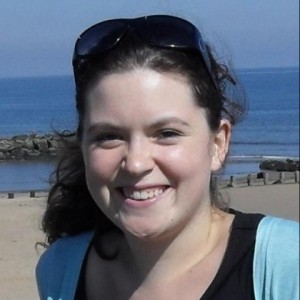Dan and I are both advocates for the communication of science,via all possible means, and that is why this week’s interview is close to our hearts.
Sarah Day’s role at the Geological Society of London focuses on conveying the importance of the study of the science behind how our planet works. I met Sarah about a year ago, when I invited her to give a talk here at Liverpool. It was a hugely successful talk which covered how geology has been communicated through the ages. Sarah made some good points in her talk. Firstly, Earth Sciences are GREAT for science communication because we can take people out into the field and show them why it is an exciting science. However, the ‘story’ (or scientific findings) are often doctored (by scientists and the media alike), so that they have greater impact, and sell more. In her talk, Sarah showed that this is not new and when it comes to communicating geology, has been going on since the industrial ages. My particular highlight was finding out that for a period from the mid 18th to the 19th century, geology was considered the coolest science!
- You are: Sarah Day
- You work at: The Geological Society of London
- Your role is: Earth Science Communicator
Q1) What are you currently working on?
All sorts of things! We’ve just finished Earth Science Week in the UK, which I hope we can grow into to a much larger event. It’s been a lot of fun finding out about the geology people are coming across in their everyday lives. We held a series of walking tours of geology in London which were a real eye opener!
Q2) What is a typical day like for you?
Unless I’m out and about at a school visit or science festival, I’m likely to be spending the first hour or so checking up on our social media accounts and responding to enquiries received via twitter/email/blog/facebook – some of which require more research than others. After that, it depends what projects are happening – I might be writing a press release, calling a scientist to interview them about their work or proof reading articles for our blog or website. When we hold events here, I’m likely to be found pestering scientists with a microphone for an interview! And during any of that, the phone could ring with a media enquiry that needs answering five minutes ago…
Q3) Does your job allow you to have any academic outputs?
One of the reasons I went into science communication was because I love finding out about science, but don’t think I have the necessary qualities to do it myself! Instead, I get to spend time with people from a huge range of disciplines and find out what they’re up to, which I love. If I did venture into academia, it would be more focused on ‘science studies’ – the history and philosophy of science and its communication – but for now I’m happy cheering researchers on from the sidelines!
Q4) What has been the highlight of your career so far?
I love it when a news story you’ve worked hard on does really well – geology can be quite a difficult sell to mainstream media (unless it involves dinosaurs.) A couple of years ago we held a meeting about The Anthropocene – a proposed new geological epoch, which made the cover of the Economist. I also really enjoyed writing a response to Iain Duncan Smith’s jibe about geologists being less useful than shelf stackers – if only more public figures would have a go at geology so we can make the news defending our members…
Having said all that, I think my proudest moment is still the press release based on some archive material, ‘Charles Darwin was crazy about dinosaurs’, which found its way onto various news sites missing the last two words….
Q5) To what locations has your research taken you and why?
One of my first projects was to take part in a meeting of the European Association of Geological Societies in Romania – luckily for me, the theme that year was ‘tourism’, so I got to see some amazing geological sites. I really enjoy delivering school workshops – it’s amazing how excited a group of children can get about rocks! – and taking part in science festivals. The furthest those have taken me is Orkney, which has a brilliant science festival every September, I recommend a trip!
Q6) Do you have one piece of advice for anyone wanting to have a career similar to yours?
Networking doesn’t have to be a dirty word – it really helps to get to know others involved in science communication, either in person or on Twitter. There are some great conferences, some of which have bursaries for people starting out, and an increasing number of free events. And whatever you end up doing, my number one rule is: no one is an expert on everything. Ask scientists the questions you think your audience will want to know the answer to and never, ever, feel stupid for doing it.
Q7) If you could invent an element, what would it be called and what would it do?
ItsJustARock-ium. (Still working on that name…) Somehow, this would create the ability in everyone to recognise that no, that interesting looking rock you found is not a meteorite. Or a dinosaur egg. Or radioactive. It’s just a rock. Please stop emailing me.
Sarah is a science communicator and author. After studying for an MA in the History and Philosophy of Science, she moved to London to study Science Communication at Imperial College. When not communicating geology/telling people their rocks aren’t meteorites, she writes fiction and occasional articles for Guardian’s Comment is Free and The Vagenda. You can find her on twitter @geowriter.


Pingback: Climate and Policy Roundup – January 2014 | Four Degrees